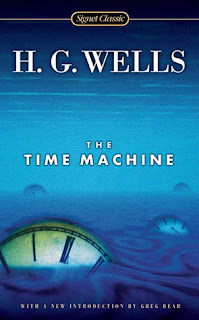At the bottom of each post, I will post labels to direct folks to other posts that fit into a similar genre -
books, and
time travel are two examples. There is also a
Sci-Fi label, but I'm reluctant to classify Audrey Niffenegger's
The Time Traveler's Wife as Sci-Fi. Of course, it seems only natural to put any time travel novel in the Sci-Fi category, but this wonderful book is something different.
The person who assembled the
23 Best Time Travel Science Fiction Books list describes
The Time Traveler's Wife as "more love story than sci-fi". That's certainly true, but I don't believe anyone should skip this book on that account.
I absolutely loved this book; I'd even go so far as to say it's the best book I've read so far this year.
Like Jack Havig in the last time travel book I read before this one (
There Will Be Time ), Henry DeTamble suffers from a genetic disorder that causes him to time travel. There are differences, of course. Jack Havig is able to travel at will, Henry DeTamble has no control over his time traveling. Jack is able to carry small items along with him - clothing, money, gold in small amounts. Henry can bring nothing - not even the clothes he's wearing. Neither time traveler can bring another person with him.
The plot summary in
the wikipedia article describes the story quite well:
"Using alternating first-person perspectives, the novel tells the stories of Henry DeTamble (born 1963), a librarian at the Newberry Library in Chicago, and his wife, Clare Anne Abshire (born 1971), an artist who makes paper sculptures. Henry has a rare genetic disorder, which later comes to be known as Chrono-Impairment. This disorder causes Henry to involuntarily travel through time. When 20-year-old Clare meets 28-year-old Henry at the Newberry Library in 1991 at the beginning of the novel, he has never seen her before, although she has known him most of her life".
As I mentioned in my review of
There Will Be Time , the final 25% of that novel contains a story line which I found totally unnecessary. In the ebook edition of
The Time Traveler's Wife , the first 25 pages of an upcoming sequel are included. Niffenegger estimated that the book "should be ready in 2018 or so". Unfortunately, it's 2022 and the sequel hasn't been released. I, for one, am looking forward to reading it.




















